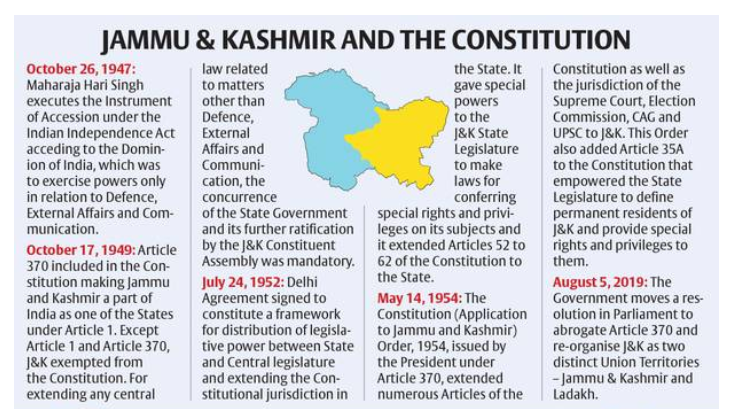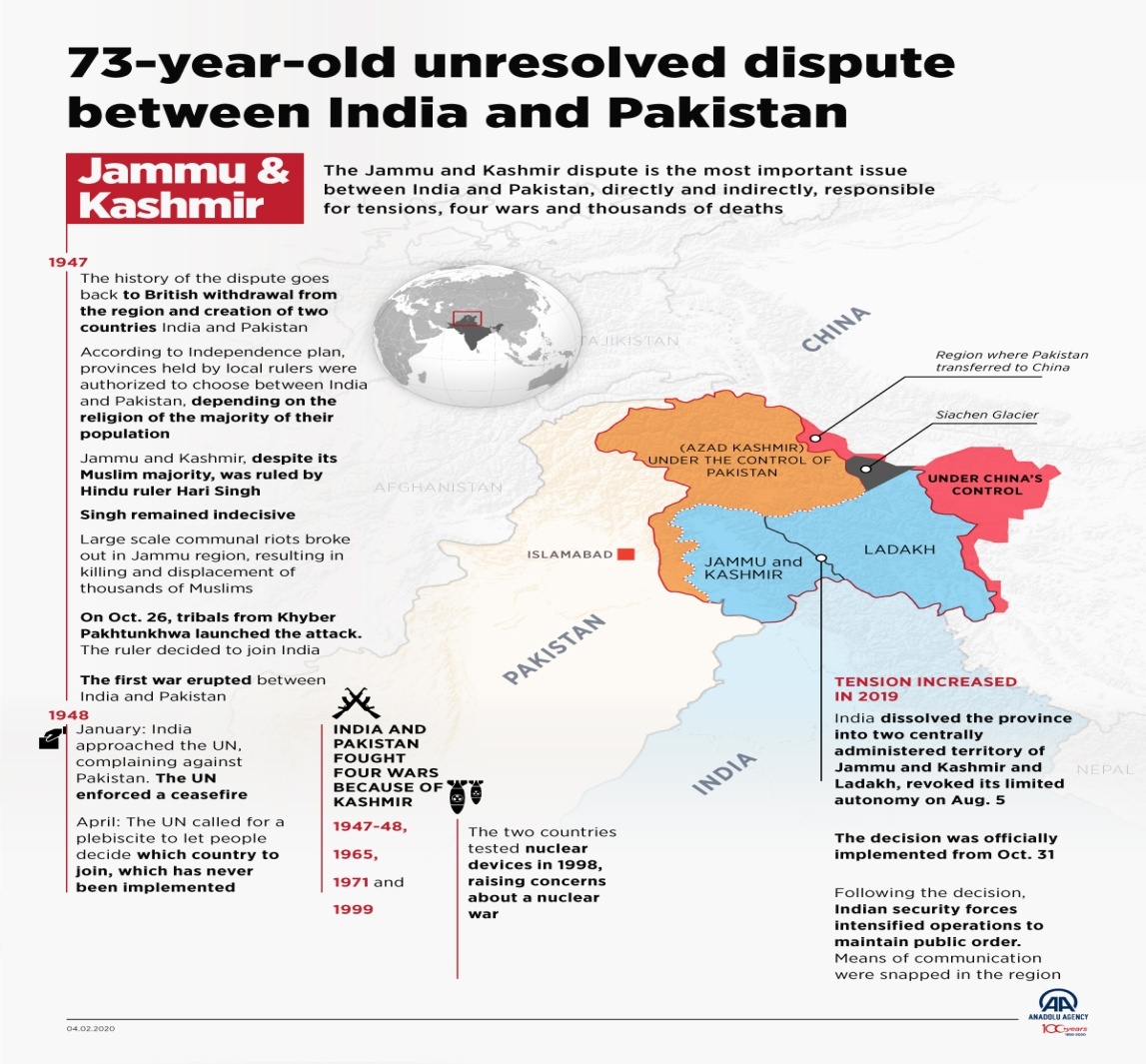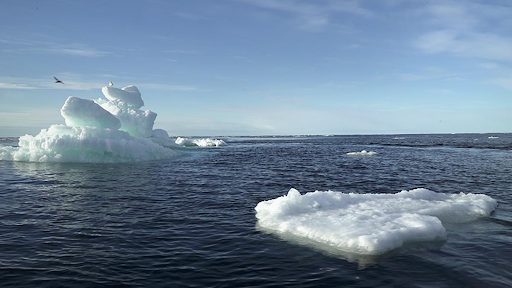Description

Copyright infringement is not intended
Context:
- New Pak PM Shehbaz Sharif puts Kashmir as a condition to have good ties with India.
Unresolved Kashmir issue:

Copyright infringement is not intended
Status of Jammu and Kashmir:
- Jammu and Kashmirlies to the north of the Indian states of Himachal Pradesh and Punjab and to the west of Ladakh, which is also subject to the dispute as a part of Kashmir, and administered by India as a union territory.
- Some areas have been disputed between India and Pakistan since 1947 and between India and China since 1962.
- The Line of Control separates Jammu and Kashmir from the Pakistani-administered territories of Azad Kashmir and Gilgit-Baltistan in the west and north.
- The state of Jammu and Kashmir was accorded special status by Article 370 of the Constitution of India.
- Jammu and Kashmir had its own constitution, flag and administrative autonomy.
- Indian citizens from other states were not allowed to purchase land or property in Jammu and Kashmir.
- Unrest and violence persisted in the Kashmiri Valley and, following a disputed state election in 1987, an insurgency persisted in protest over autonomy and rights.
- A resolution to repeal Article 370 was passed by both the houses of the Parliament of India in August 2019. At the same time, a reorganization act was also passed, which reconstituted the state into two union territories, Jammu and Kashmir and Ladakh. The reorganization took effect from 31 October 2019.
- This also suspended Article 35A.
- Article 35Ahad allowed J&K to define who its ‘permanent residents’ are and what rights and privileges are attached to such residency.
- At present, the union territory of Jammu and Kashmir is administered under the provisions of Article 239 of the Constitution of India. The Article 239A, originally formulated for the union territory of Puducherry, will also be applicable to Jammu and Kashmir.
India-Pakistan relations:
- India and Pakistan share linguistic, cultural, geographic, and economic links, yet their relation has been mired in complexity due to a number of historical and political events.
- Indo-Pak relations have been defined by the violent partition of British India in 1947, the Jammu & Kashmir conflict and the numerous military conflicts fought between the two nations.
- Soon after gaining their independence, India and Pakistan established diplomatic relations, but the violent partition and reciprocal territorial claims quickly overshadowed their relationship.
- Since their independence, the two countries have fought three major wars, as well as one undeclared war, and have been involved in numerous armed skirmishes and military standoffs.
- The Kashmir conflict is the main centre-point of all of these conflicts with the exception of the Indo-Pakistan War of 1971 and the Bangladesh Liberation War, which resulted in the secession of East Pakistan (now Bangladesh).
- Since the early 1980s, relations between the two nations have grown increasingly sour, particularly after the Siachen conflict, intensification of the Kashmir insurgency in 1989, Indian and Pakistani nuclear tests in 1998, 1999 Kargil War, 2001 Indian Parliament attack, 2007 Samjhauta Express bombings, the 2008 Mumbai attacks, the 2016 Pathankot attack and the 2019 Pulwama attack resulted in a severe blow to the ongoing India–Pakistan peace talks.
Attempts for engagement
- India has followed a consistent and principled policy towards Pakistane.: in keeping with its “Neighbourhood First Policy”, India seeks normal neighbourly relations with Pakistan.
- There have been numerous attempts to improve the relationship, notably the Shimla summit, the Agra summit, and the Lahore summit.
- In 2014, India has invited the then Prime Minister Nawaz Sharif for the swearing-in ceremony of PM Modi
- External Affairs Minister (EAM) took the initiative to propose a Comprehensive Bilateral Dialogue with acts of cross-border terrorism and violence against India including the cross-border terror attack on Pathankot Airbase on 2 January 2016; attack on Army Camp in Uri in August 2016; and terror attack on the convoy of Indian security forces in Pulwama by Pakistan based Jaish-e-Mohammad (JeM) on 14 February 2019.
- Time and again India has stressed on creating trust and an environment free of violence and terrorism for fostering cooperation for peace, progress and prosperity in the region.
- On 7 August 2019 Pakistan took unilateral actions to downgrade diplomatic relations with India in an attempt to present an alarming picture of bilateral ties to the world.
Security issues:
- Cross-border Terrorism: Terrorism emanating from territories under Pakistan's control remains a core concern in bilateral relations. India has consistently stressed the need for Pakistan to take credible, irreversible and verifiable action to end cross border terrorism against India.
- India has repeatedly called upon Pakistan to bring perpetrators of Mumbai terror attacks to justice expeditiously. However, there has been no progress in the ongoing trial of Mumbai terror attacks case in Pakistan even after all the evidence has been shared with Pakistan side.
Trade and Commerce
- India had accorded Most Favored Nation status to Pakistan in 1996. Pakistan cabinet decision to reciprocate remains unimplemented.
- In August 2012, India announced a reduction of 30% in its SAFTA Sensitive List for non-Least Developed Countries of SAFTA [including Pakistan], bringing down tariff on 264 items to 5% within a period of three years.
- Pakistan continued to follow a restrictive trade policy towards India.
- In the aftermath of cross border terror attack in Pulwama, India withdrew the Most Favoured Nation Status to Pakistan.
- India also hiked customs duty on exports from Pakistan to 200% on 16 February 2019. Subsequently, as part of its unilateral measures, Pakistan suspended bilateral trade with India on 7 August 2019.
Indus Waters Treaty
- The Indus Waters Treaty governs the rivers that flow from India into Pakistan.
- Water is cited as one possible cause for a conflict between the two nations, but to date issues such as the Nimoo Bazgo Project have been resolved through diplomacy.
People to People Relations
- As of 01 July, 2019, 209 fishermen and 52 other civil prisoners who are believed to be Indian nationals were in the custody of Pakistani authorities.
- India suggested to Pakistan to revive the mechanism of the Joint Judicial Committee which looks into humanitarian issues of fishermen and prisoners in each others custody.
- The visit to religious shrines between India and Pakistan is governed by the Bilateral Protocol on Visits to Religious Shrines signed between India and Pakistan in 1974. The protocol provides for three Hindu pilgrimage and four Sikh pilgrimage every year to visit 15 shrines in Pakistan while five Pakistan pilgrimage visit 7 shrines in India.
Kartarpur Corridor
- The Government of India in 2018 formally conveyed to the Government of Pakistan that it would initiate the Kartarpur Corridor on the Indian side and urged Pakistan to build a corridor with suitable facilities in its territory from the international border to Gurdwara Kartarpur Sahib in Pakistan to facilitate easier access and smooth passage of Indian pilgrims throughout the year.
Cultural links
- India and Pakistan, particularly Northern India and Eastern Pakistan, to some degree have similar cultures, cuisines and languages due to common Indo-Aryan heritage which span through the two countries and throughout much of the northern subcontinent which also underpin the historical ties between the two.
- Pakistani singers, musicians, comedians and entertainers have enjoyed widespread popularity in India. Likewise, Indian music and film are very popular in Pakistan.
Sporting ties
- Cricket and hockey matches between the two have often been political in nature.
- In tennis, Rohan Bopanna of India and Aisam-ul-Haq Qureshi of Pakistan have formed a successful duo and have been dubbed as the "Indo-Pak Express”.
https://www.hindustantimes.com/india-news/new-pak-pm-shehbaz-sharif-puts-kashmir-as-condition-to-have-good-ties-with-india-101649689282629.html














